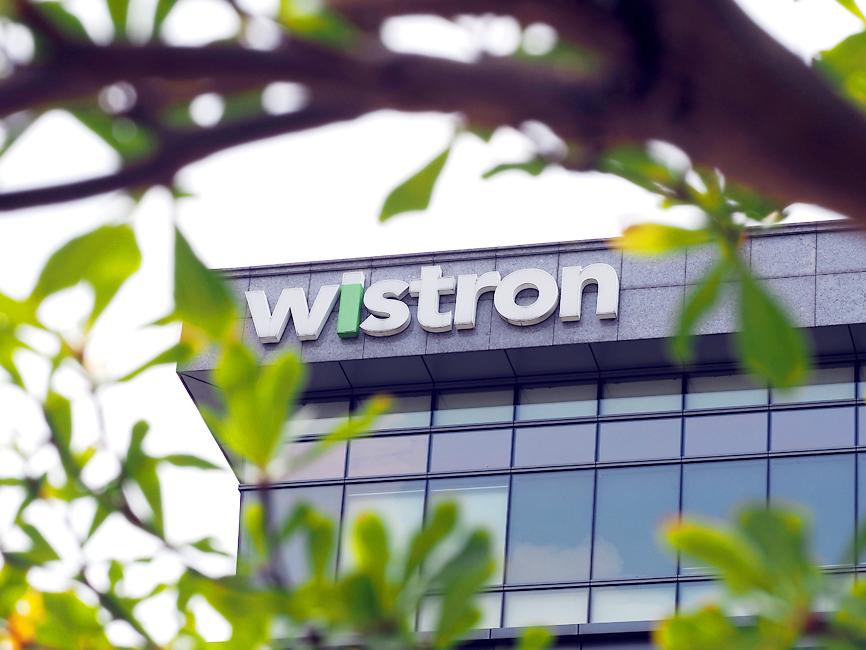Wistron Corp’s (緯創) board of directors has agreed to expand the company’s server production capacity at home and abroad, as well as sell its mobile phone business in China’s Kunshan in January, the company said last week.
The contract electronics maker — whose products include handsets, servers, laptops, PCs, tablets, video game consoles and LCD modules — has been expanding its non-Chinese production capacity over the past year, including in Taiwan, India, Malaysia, Vietnam and even in Texas, amid US-China trade tensions and geopolitical uncertainties.
The company’s board on Thursday approved a proposal to invest US$28 million in Wistron InfoComm Technology (Texas) Corp to add server production capacity at its Mexican plant to support exports to the US, according to company regulatory filings.

Photo: David Chang, EPA-EFE
The board also agreed to lease a plant owned by solar module supplier United Renewable Energy Co (聯合再生能源) in Hsinchu County’s Hukou Township (湖口) for NT$13.02 million (US$451,347) per month as Wistron aims to expand its server assembly capacity in Taiwan, regulatory filings showed.
As for its handset business, the company has reached a deal with China’s Luxshare Group (立訊集團) to sell its Kunshan plant for 3.3 billion yuan (US$499.52 million) and the board on Thursday agreed to close the deal on Jan. 1, while increasing investment in India, the filings showed.
“Wistron will invest more resources in profitable businesses after the disposal of its handset segment,” Yuanta Securities Investment Consulting Co (元大投顧) analysts led by Harvey Kao (高啟瑋) said in a note on Friday. “As the company will lean more on its server business going forward, we expect the contribution from server sales to rise from 27 percent this year to more than 35 percent next year.”
Its server business would become a key sales driver for Wistron next year, as the company’s notebook computer and LCD module businesses are likely to see flat sales compared with this year, while the PC segment would likely see mild market share gains, driven by more order wins from US clients, Yuanta said.
Wistron on Thursday reported third-quarter net profit of NT$2.78 billion, up 61.67 percent from a year earlier, while earnings per share rose from NT$0.61 to NT$1.
Gross margin increased to 5.37 percent, from 5 percent, thanks to a favorable product mix and contribution from its cloud computing equipment subsidiary Wiwynn Corp (緯穎科技).
Foreign-exchange gains of NT$240 million from effective hedging also lent support to margin performance.
In the first three quarters, net profit totaled NT$6.36 billion, or earnings per share of NT$2.26, and gross margin came in at 5.38 percent, the company said.

NEW IDENTITY: Known for its software, India has expanded into hardware, with its semiconductor industry growing from US$38bn in 2023 to US$45bn to US$50bn India on Saturday inaugurated its first semiconductor assembly and test facility, a milestone in the government’s push to reduce dependence on foreign chipmakers and stake a claim in a sector dominated by China. Indian Prime Minister Narendra Modi opened US firm Micron Technology Inc’s semiconductor assembly, test and packaging unit in his home state of Gujarat, hailing the “dawn of a new era” for India’s technology ambitions. “When young Indians look back in the future, they will see this decade as the turning point in our tech future,” Modi told the event, which was broadcast on his YouTube channel. The plant would convert

‘SEISMIC SHIFT’: The researcher forecast there would be about 1.1 billion mobile shipments this year, down from 1.26 billion the prior year and erasing years of gains The global smartphone market is expected to contract 12.9 percent this year due to the unprecedented memorychip shortage, marking “a crisis like no other,” researcher International Data Corp (IDC) said. The new forecast, a dramatic revision down from earlier estimates, gives the latest accounting of the ongoing memory crunch that is affecting every corner of the electronics industry. The demand for advanced memory to power artificial intelligence (AI) tasks has drained global supply until well into next year and jeopardizes the business model of many smartphone makers. IDC forecast about 1.1 billion mobile shipments this year, down from 1.26 billion the prior

People stand in a Pokemon store in Tokyo on Thursday. One of the world highest-grossing franchises is celebrated its 30th anniversary yesterday.

Zimbabwe’s ban on raw lithium exports is forcing Chinese miners to rethink their strategy, speeding up plans to process the metal locally instead of shipping it to China’s vast rechargeable battery industry. The country is Africa’s largest lithium producer and has one of the world’s largest reserves, according to the US Geological Survey (USGS). Zimbabwe already banned the export of lithium ore in 2022 and last year announced it would halt exports of lithium concentrates from January next year. However, on Wednesday it imposed the ban with immediate effect, leaving unclear what the lithium mining sector would do in the